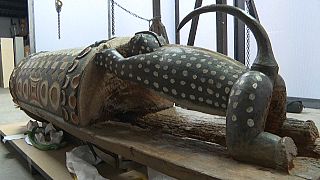France
New bill allows France's government to expedite the return of African heritage without parliamentary approval, but bureaucratic hurdles remain for former colonies.
Culture minister, Rachida Dati, presented the law to the French cabinet on Wednesday, which is part of a broader commitment made in 2017 by President Emmanuel Macron to return African heritage.
The bill aims to simplify current procedures to return cultural property that was acquired illegally; either stolen, looted or taken with violence between 1815 and 1972 during France’s colonial empire.
“The text I presented this morning to the Council of Ministers is a powerful act and a powerful ambition! For peace, for the recognition of memories, and for the renewal of our relations with countries that were wronged”, Dati wrote in a post on X.
State of French restitution efforts
France has lagged behind other European nations like Germany, which has returned more than a thousand objects to African states.
Meanwhile, France has only deaccessioned a few objects since Macron declared in Burkina Faso in 2017 that he would make the return of African artefacts ”a top priority” for his government within the next five years.
Most recently, France agreed to give a sacred drum back to the Ivory Coast that colonial troops took from the Ebrie tribe in 1916.
France has been slow partly because the country needs to pass a new law for each restitution it consents to - a long process that can take years.
Wednesday’s law would instead allow the French government to approve by decree the return of cultural heritage to countries of origin under certain conditions.
Bureaucratic hurdles remain
However, the new law does not guarantee that African countries will get their cultural property back faster, according to Catherine Morin-Desailly, a senator and member of the French Senate Culture Committee.
"I’m going to be nuanced because for each object it is also necessary to examine the request and to have a scientific, historical and legal study that allows us to affirm that it is indeed the right object," she said.
The law proposes complicated requirements before an artefact can be returned without French parliament approval.
First and foremost, documentation must be submitted to a bilateral scientific committee proving that an artefact was taken by illicit means.
Then France’s senior administrative jurisdiction, Conseil d’Etat, will give the final approval to restitute the object.
Only artefacts intended for future public display will be taken into consideration, and military items, public archives and items found during archaeological digs are excluded from the proposed legislation.
Opposition sounds the alarm
Senator Pierre Ouzoulias, who is a member of France’s cultural commission, said in an interview with The Art Newspaper that he “deeply regrets” the government’s attempt to rush “such a complex matter, after years of delay when Dati did nothing to move forward with the bill”.
He requested that an independent scientific body be appointed to have oversight of the approval process to avoid the government using restitutions as a political tool.
"France has not finished mourning its colonial past. That's one of the challenges of restitution", Ouzoulias wrote on X.
African countries, including Senegal, Chad, Ethiopia and Algeria, have requested the return of tens of thousands of objects from France.
The French Senate is expected to vote on the new bill on September 24th.














Go to video
Over 140 Ethiopian migrants presumed dead after shipwreck off Yemen
01:19
LIST: Trump puts new tariffs on 20 African nations
01:00
New Hemingway-inspired mural unveiled in Latvian port city
01:00
Pix of the Day: July 31, 2025
Go to video
Ghana expands visa-free travel with Global South as US borders tighten
01:02
Le Court becomes first African woman to win Tour de France stage